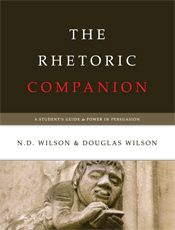Godly Rhetoric
.
From The Power in Persuasion: An Interview with N.D. Wilson and Doug Wilson
How has our postmodern society affected the way we think about rhetoric and persuasion?
Postmodernism is really nothing new. It is just ancient sophistry in a rented tux. Lots of mouth and no muscle. But what we say in the book most directly collides with both modernism and its wee post when we discuss the nature of proof. Skip papa modernism’s crusade for humanistic omniscience and you skip postmodernism’s adolescent daddy issues.
You observe that, today, most are nervous about using pathos (emotion) when trying to persuade. Why?
They are rightly jumpy about someone using emotions to (cynically) manipulate an audience. If a politician can summon up a tear the same way a professional actor can, the insincerity is obvious. And insincere persuasion is not something that Christians can accept. But consider it the other way around. With certain topics, if a speaker is not moved emotionally himself, then he clearly does not believe what he himself is saying. If he did believe it, then he would have to be moved. Pathos can be abused, just like every other element of public speech—but for Christians its entire absence must also be considered an abuse.


























